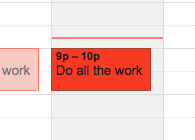
Photo by visualpanic
This spring, college students will be making decisions about the future. Whether “the future” means this summer, the next year, or the next five years, such decisions are always difficult, loaded as they are with the weight of opportunity costs. In these circumstances, a seemingly promising strategy is to maximize the possibilities you’ll have in the future. After all, isn’t college meant to open doors for you?
While it is true that college opens doors, a number of sources indicate that it is best to close most of those doors. Keeping your options open has a cost. Continue reading








